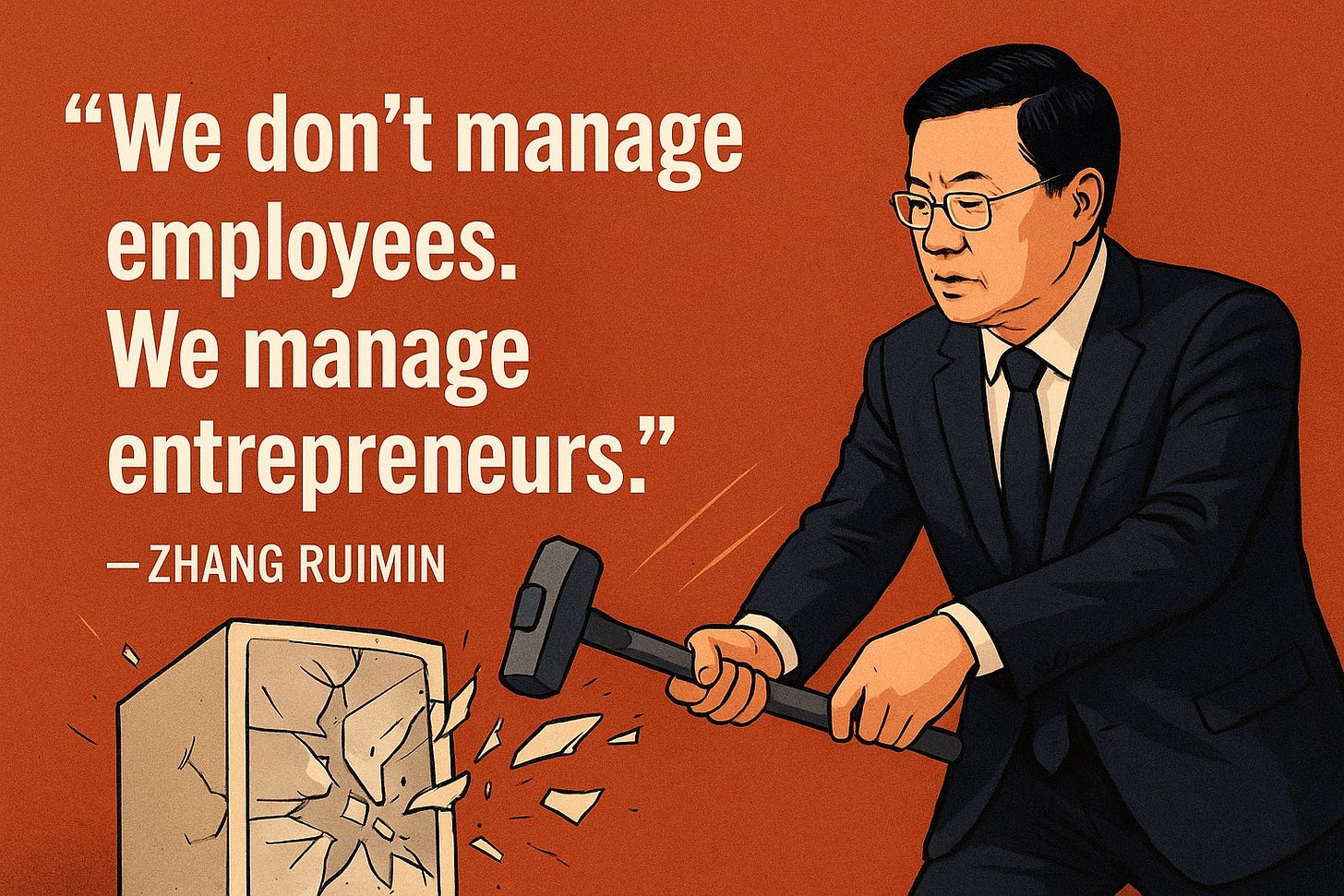Can a Giant Company Really Move Like a Startup?
The Haier story proves it can and shows how your own organization can, too.
The Question That Should Keep Every CEO Awake
What if the very size that once made you strong is now the enemy?
In every industry, scale promises efficiency but too often delivers bureaucracy, slow decisions, and leaders drowning in meetings.
Most executives sense this danger, yet few dare to rip apart the structures that got them here.
Zhang Ruimin, the visionary behind China’s Haier Group, asked a bolder question:
What if we gave up control to gain speed?
From Sledgehammer to Superstar
In 1985, Zhang inherited a failing refrigerator factory in Qingdao. Legend says he lined up 76 defective fridges, handed out sledgehammers, and smashed them in front of stunned employees. “If we don’t destroy the bad, the bad will destroy us,” he declared.
This wasn’t theater it was a manifesto. Quality would be sacred. Complacency was the true enemy.
By the late 1990s, Haier had become a national champion in appliances, consistently ranking No. 1 in China across major categories.
But success planted a different poison. Ten layers of management, hundreds of incompatible IT systems, and decisions needing seven approvals turned the company into the very bureaucracy it once defied.
2005: The Day the Hierarchy Died
Zhang acted with the same ferocity he’d shown with that first sledgehammer. Around 2005, he dismantled Haier’s corporate pyramid. More than 12,000 middle managers were eliminated. HR shrank from over 800 staff to barely a dozen.
In their place he created 4,000 “micro-enterprises” tiny, autonomous teams of 10–15 people, each with its own profit-and-loss responsibility.
Pay wasn’t a salary; it came from customers. Hit your targets and you shared in the upside. Miss, and your unit could disappear.
As Zhang put it in a McKinsey Quarterly interview:
“We don’t manage employees. We manage entrepreneurs.”
These micro-enterprises could even compete for internal contracts against external vendors. No favoritism, only market discipline.
Results That Speak in Billions
The gamble worked. Haier’s revenue climbed from roughly US $7 billion in 2002 to about US $36 billion in 2023 (Haier Smart Home annual report). Net profit grew in double digits year after year, even through global slowdowns.
The culture bred innovation. A handful of employees launched Thunderobot, a gaming-laptop venture incubated entirely inside Haier, proving that breakthrough ideas no longer needed executive approval.
And when Haier bought GE Appliances in 2016, Zhang told the American team:
“I haven’t come to manage you. We both report to the same boss: the customer.”
Since then, GE Appliances has steadily expanded U.S. market share (company filings, 2024).
The Mindset Behind the Miracle
Haier’s transformation wasn’t just an org-chart shuffle. It was a new philosophy:
Customer as CEO. Every decision starts and ends with the end-user.
Radical decentralization. Push power to the smallest responsible unit.
Entrepreneurial accountability. Teams live or die by market response, not seniority.
Platform over pyramid. Shared services—IT, finance, HR—exist to enable, not control.
Business thinker Gary Hamel calls this “humanocracy” freeing people to act like owners. Haier lived it before it had a name.
Lessons for Every Large Corporation
Signal Zero Tolerance for Mediocrity. Symbolic acts—like Zhang’s sledgehammer—create cultural shockwaves that PowerPoint slides never will.
Collapse the Middle. Ask which management layers truly add value. If a decision needs seven signatures, you’ve built a moat around mediocrity.
Create Mini-Founders. Give small teams profit responsibility and autonomy. Compensation tied to customer value unlocks motivation spreadsheets can’t measure.
Turn HQ Into a Platform. Central functions should be service providers, not gatekeepers.
Embrace the Risk. Some teams will fail. Protect learning, not ego.
As Peter Drucker wrote,
“The greatest danger in times of turbulence is not the turbulence—it is to act with yesterday’s logic.”
Haier’s genius was to destroy yesterday’s logic before the market destroyed Haier.
Your Move
If your company is drowning in approvals and meetings, Haier’s journey is a challenge and an invitation. The real lesson is not “copy the 4,000 micro-enterprises model,” but adopt the courage to surrender control.
Because the surest way to stay big tomorrow is to think small today.
Sources & References
McKinsey Quarterly: “Shattering the Status Quo: A conversation with Haier’s Zhang Ruimin,” 2023.
Haier Smart Home Annual Report 2023 (RMB 261.4 billion revenue ≈ US $36 billion).
Time Magazine profile, “Zhang Ruimin’s Sledgehammer Moment,” 2014.
Gary Hamel & Michele Zanini, Humanocracy: Creating Organizations as Amazing as the People Inside Them, 2020.
Curiosity, courage, and customer obsession turned a lumbering appliance maker into a global startup. What could they do for you?


